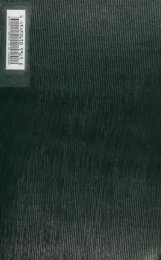A System of Heraldry - Clan Strachan Society
A System of Heraldry - Clan Strachan Society
A System of Heraldry - Clan Strachan Society
Create successful ePaper yourself
Turn your PDF publications into a flip-book with our unique Google optimized e-Paper software.
358<br />
OF FISHES.<br />
fesse-ways, looking to the sinister, and two to the dexter chief and flank points :<br />
<strong>of</strong> which before, at the title <strong>of</strong> fret andfrette, page 216.<br />
The Town <strong>of</strong> GLASGOW carries argent, an oak tree growing out <strong>of</strong> a mount in<br />
base, with a bird standing on the top there<strong>of</strong>, and a bell hanging on a branch in<br />
the sinister side, and in base a salmon fish, with a ring in its mouth, all proper ;<br />
to perpetuate the story <strong>of</strong> a miracle said to be wrought by St Mungo, that town's<br />
patron saint, in recovering by a salmon, in its mouth, the ring <strong>of</strong> a lady out <strong>of</strong> the<br />
water <strong>of</strong> Clyde, where she accidentally dropt it, which being got, prevented tht-<br />
jealousy <strong>of</strong> her husband.<br />
The name <strong>of</strong> SALMON, in England, sable, three salmon fishes haurient argent,<br />
speaking to the name.<br />
The name <strong>of</strong> ORD, in Northumberland upon Tweed, azure, three fishes haurient<br />
argent. The principal family <strong>of</strong> the name is <strong>of</strong> an old standing, as Ord <strong>of</strong> that<br />
Ilk, and <strong>of</strong> Felkington, from which there are several considerable families in that<br />
country.<br />
In France, the name <strong>of</strong> PISSON, from piscis a fish, gules, a carp naiant in fesse.<br />
The name <strong>of</strong> CIIABOT there, or, three chabot fishes, 2 and i gules; for which see<br />
Monsieur Baron's I'Art dc Blaswi.<br />
Naiant is said when fishes are placed fesse-ways, as fig. 17. Plate XI.<br />
In England, the name <strong>of</strong> PIK.TON, argent, three pikes naiant in pale.<br />
Art. Her.<br />
The name <strong>of</strong> ELLIS, argent, three eels naiant in pale sable . Ibid.<br />
And with us the surname <strong>of</strong> ORNEEL, or ARNEEL, argent, two eels pale-ways<br />
waved between two stars in the flanks azure. W. MS.<br />
The name <strong>of</strong> SPROTTY, gules, three salmons (some say trouts) haurient, with a<br />
ring through each <strong>of</strong> their noses argent. Mack. Her.<br />
CRAB <strong>of</strong> Robslaw, azure, a cheveron argent, between two flower-de-luces in<br />
chief, and a crab-fish in base or.<br />
The name <strong>of</strong> SHELLY, in England, sable, a fesse ingrailed between three wilks or;<br />
the same borne by Sir JOHN SHELLY <strong>of</strong> Michgrave in Sussex, Baronet. Art. Her.<br />
Since I have come the length <strong>of</strong> shell-jisbes, I shall insist, so far as I have room<br />
in this Volume <strong>of</strong> <strong>Heraldry</strong>, upon the escalop, cocquel and vannet, since they artso<br />
frequent in armorial figures, all Europe over, on account <strong>of</strong> their symbolical and<br />
As Sal-<br />
hieroglyphical significations which some have been pleased to give them :<br />
ter, an Englishman, in his writings, tells us, that, in the Records <strong>of</strong> the Office at<br />
Arms in London, the escalop signifieth, that tire first <strong>of</strong> a family who carried an<br />
escalop has been a commander, and for his virtues and valour had gained the<br />
hearts and love <strong>of</strong> his companions and soldiers. The Italian, Sylvester Petra<br />
Sancta, in his Treatise, commends them as c<strong>of</strong>fers <strong>of</strong> the riches <strong>of</strong> the sea, and calls<br />
them scrinia colornm atque gemmaruvi.<br />
Others again look upon them as fit badges <strong>of</strong> inviolable fidelity, on account that<br />
the shells <strong>of</strong> the escalop or cocquel are married by nature in pairs and ; that, when<br />
separate, they can never be matched again to join with others ; for which they<br />
have been chosen by sovereigns and others, as apposite badges <strong>of</strong> fraternity <strong>of</strong> seve-<br />
ral orders <strong>of</strong> knighthood and other societies.<br />
They have been also for many ages the badges and marks <strong>of</strong> pilgrims in their<br />
expeditions and pilgrimages to holy places, and <strong>of</strong> such a distinguishing character<br />
and mark, that Pope Alexander IV. by a bull, discharged the giving the use <strong>of</strong><br />
them but to pilgrims who were truly noble; as Ashmole, in the Institutions <strong>of</strong> the<br />
Garter, observes, chap. ii. sect. 5. where also he gives several instances <strong>of</strong> the escalops<br />
adorning the orders <strong>of</strong> knighthood, as that called the Order <strong>of</strong> St James in<br />
Gallicia, institute in the year 837, had, for its ensign,<br />
a red cross in a white field,<br />
cantoned with four escalops.<br />
The escalop, or cocquel, was so much esteemed in France, that St Lewis, in the<br />
year 1269, instituted the noble Order <strong>of</strong> the Ship, upon his expedition into Africa,<br />
ackirned the collar <strong>of</strong> that Order with escalops <strong>of</strong> gold, interlaced with double crescents<br />
<strong>of</strong> silver ; and Louis XI. <strong>of</strong> France, when he, in the year 1469, instituted the<br />
Order <strong>of</strong> St Michael, he composed the collar with escalops ol gold, joined one with<br />
another, fastened to small chains or mails <strong>of</strong> gold.<br />
The c.scalop, or cocquel, with the French, are all one ; but when they want ears,<br />
the French call them vannets. We make no distinction, and use only the term<br />
escalop, and are latined conchas mannas.




